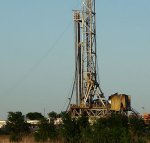Natural gas is often touted as being more than a stopgap solution for coal’s contribution towards rising average global temperatures; but news of its climate change mitigation benefits may be somewhat exaggerated.
Australia is at an important crossroads when it comes to energy, but before we go forth drilling thousands of holes in valuable farmland with the associated potential risks to our equally valuable water supplies, the reported benefits of natural gas in terms of climate change may need a little more scrutiny.
A new study to emerge from the National Center for Atmospheric Research (NCAR) concludes that while burning of natural gas emits far less carbon dioxide than coal, a reliance on it would fail to significantly slow down climate change.
The study by Adelaide-born Tom Wigley, a senior research associate at NCAR, states while coal combustion is far more emissions intensive, it also generates comparatively large amounts of sulfates and other particles. While these particles have a marked negative impact on the environment in many ways, they also somewhat cool the planet by blocking incoming sunlight; an odd “harm reduction” side effect.
The burning of natural gas doesn’t generate the same level of particulate shielding effect. Additionally, there is uncertainty about the level of methane leaking from natural gas operations. Methane is a powerful greenhouse gas, with many times the global warming potential (GWP) of carbon dioxide.
Wigley’s computer simulations suggest a global, partial shift to natural gas would actually slightly accelerate climate change through to at least 2050, even without methane leaks. This period would extend to 2140 with a certain level of methane leakage. After that time, natural gas would start to slow down global average temperature increases, but only by “a few tenths of a degree” – far less than what is needed and far too long into the future before it would even begin happening.
The world’s increasing love affair with natural gas is sometimes seeing the fossil fuel being viewed more as a long-term alternative rather than a stepping stone. Natural gas being considered a panacea could threaten the amount of support truly emissions free power generation technology, such as solar power, receives – in addition to further wrecking land and contaminating water supplies through extraction methods such as fracking.
Source: Coal to gas: The influence of methane leakage
Image source: David R Tribble












































